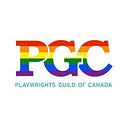Featured Member — Adam Pottle

**Each month we interview member playwrights to share their work, stories and inspiration with the community. We recently spoke with Adam Pottle, an award-winning author whose work explores the discomforting and liberating aspects of Deafness and disability.
Tell us a bit about your playwriting background.
I got into playwriting by accident. In 2012 or so, I was working on a poem that I called “Ultrasound,” and it was about a Deaf het couple who plan to have a child. The man, Alphonse, wants the child to be deaf, but his wife, Miranda, is fine with it being hearing or deaf. As I worked on the poem, the two voices became stronger and stronger, so strong they exceeded the bounds of poetry and became a theatre piece.
My background is in fiction and poetry. I didn’t major in theatre. I’m not an actor or designer or director. But a play just seemed the best way to tell that story.
In the process of bringing Ultrasound to the stage (it was produced in Toronto in 2016 by Cahoots and Theatre Passe Muraille), I met so many wonderful and talented actors, directors, designers, and producers. Marjorie Chan, Yvette Nolan, Andy McKim, Kate Vandermeer, Regine Gabriel, Sandi Becker, Sally Roberts, Chris Dodd, and Elizabeth Morris were such encouraging people, and while working with them, I got bitten by the theatre bug.
Last year, I wrote a story — not a play script, but a six-page fantasy story — called Queen Seraphina and the Land of Vertebraat. It was a musical that Sum Theatre in Saskatoon produced for its annual Theatre in the Park program. The story’s set in a fantasy land that’s fully accessible. (The producers of Game of Thrones could take a few notes.) A villain named Bracken visits Vertebraat and turns it upside down, casting out the Queen and ostracizing the disabled citizens.
That play was quite a different experience. I wrote the story, then the entire company got together to flesh out the script collaboratively. We wrote songs together. We composed scenes and dialogue. It was great fun.
And now my new play, The Black Drum, is coming out this summer with Soulpepper. Two or three years ago, Joanne Cripps at the Deaf Culture Centre in Toronto commissioned me to write a script for a Signed musical, and I came onboard and created The Black Drum. I’ve been incredibly fortunate to meet so many great people and to have my work staged by these companies, because Deaf and disabled stories seldom receive such attention. That needs to change.
Is there anyone that has spurred your writing?
Many people have spurred me to be better in my writing by challenging me through their own work. Brad Fraser. Toni Morrison. Paul Beatty. Bruce Hunter. Marjorie Chan. Alicia Elliott. Jen Sookfong Lee. Jordan Peele. Stephen King. I learn the most from people who don’t accept the easy path, who don’t accept stereotypes or cliches or lazy language, who find new, more exhilarating ways of telling stories.
I’m also spurred by my community of Deaf and disabled people. Our culture is so dismissive of disabled stories. Publishers, theatres, galleries, and film and television producers are missing out on a whole segment of the population. If they listened to us, and let us tell our stories, they’d see that Deaf and disabled artists are among the most challenging and innovative on the planet. We have the potential to open a whole new chamber in people’s imaginations. I’ve been working my ass off to change the mainstream conception of disability, as have many other writers and artists like Paul David Power, Leelee Oluwatoyosi Eko Davis, Jess MacCormack, melannie monoceros, Imani Barbarin, Ilya Kaminsky, Dominick Evans, Keah Brown, Dorothy Ellen Palmer, Hamilton, Bronwyn Berg. There are over a billion disabled people on the planet. It’s a massive audience.
For those who have never experienced a Signed musical, what can they expect?
A glimpse into a new form of beauty. Signed music is pure joy to watch. It challenges the idea that music is purely auditory. It is a means of expression, a way of telling a story. The performers we have in The Black Drum are world-class, and they will show the audience how truly beautiful Deafness is.
Any upcoming works that we should be keeping an eye out for?
University of Regina Press recently published my fourth book, Voice: Adam Pottle on Writing with Deafness, and I’ll be reading from that book across Canada over the next few months (and hopefully beyond!). I have a few projects that I’m keeping under wraps at the moment, but I’ll announce them when the time’s right.
Which of your plays is your favourite, and why?
It’s hard to say, because I haven’t seen The Black Drum performed onstage yet, so I don’t know how it’ll work out, but I do like the script of The Black Drum. I’m mentally ill, with depression and anxiety, and I poured many of my fears and my hopes into the script.
Which PGC service has been the most beneficial for you?
Contract consultation, definitely. I’m a relative newbie, so having Rebecca Burton there to guide me through contract negotiations has been fantastic. I’m grateful for her and for the PGC.
Disclaimer: Playwrights Guild of Canada (“PGC”) is a national arts service mandated to engage and grow an active Canadian writing community. We promote Canadian plays around the world to advance the creative rights and interests of professional Canadian playwrights for the stage. The views of our members are their own. The opinions of PGC as an association remain neutral.
